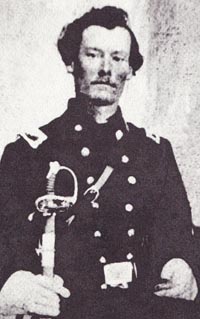This past weekend, I had the chance to attend the Emerging
Civil War conference in Spotsylvania, Virginia. The theme for the event was
"Great Attacks of the Civil War," and that got me to thinking: what
were the great attacks in the Civil War in North Carolina?
Now it would be easy to put the assault of Hardee's and
Stewart's men at Bentonville, or Ames' Division at Fort Fisher. But what came
to mind are two much smaller affairs, that had greater repercussions.
 The first of my two "Great Attacks" takes place in
1861. Forts Clark and Hatteras were constructed either
side of Hatteras Inlet not long after North Carolina left the Union. They were
meant to keep the Federals out of the Pamlico Sound. On August 28, 1861,
Federal naval ships bombarded Fort Clark. Unable to return fire due to the
range, Confederate forces fled to Fort Hatteras. Fort Clark was captured, and
the Union naval vessels turned their attention toward Fort Hatteras. After
several hours of intense bombardment, the fort surrendered, and 700
Confederates became prisoners of war. The loss of these two installations
opened the Pamlico Sound to the Union navy and army. Roanoke Island fell in
February 1862, the battle of New Bern was fought in March 1862, and Fort Macon
fell on April 26, 1862. Later, Federal soldiers set out on raids against
Kinston, and battles were fought at Wyse's Fork (this is a short list), all
because these two small forts fell in August 1861.
The first of my two "Great Attacks" takes place in
1861. Forts Clark and Hatteras were constructed either
side of Hatteras Inlet not long after North Carolina left the Union. They were
meant to keep the Federals out of the Pamlico Sound. On August 28, 1861,
Federal naval ships bombarded Fort Clark. Unable to return fire due to the
range, Confederate forces fled to Fort Hatteras. Fort Clark was captured, and
the Union naval vessels turned their attention toward Fort Hatteras. After
several hours of intense bombardment, the fort surrendered, and 700
Confederates became prisoners of war. The loss of these two installations
opened the Pamlico Sound to the Union navy and army. Roanoke Island fell in
February 1862, the battle of New Bern was fought in March 1862, and Fort Macon
fell on April 26, 1862. Later, Federal soldiers set out on raids against
Kinston, and battles were fought at Wyse's Fork (this is a short list), all
because these two small forts fell in August 1861. |
| George Kirk |
My second pick is on the other end of the state. In June 1864,
then Capt. George W. Kirk led a small band of men, about 120, mostly from the
2nd North Carolina Mounted Infantry (US), on a raid against Camp Vance just
east of Morganton in Burke County. The capture of the camp and the skirmishes
(maybe three or four), fought between Kirk and various home guard elements as
the Federals attempted to flee back to east Tennessee, are minor in the grand
pantheon of Civil War battles. However, Kirk's Raid showed many that with the
Confederate abandonment of east Tennessee, the back door to the heart of the
Confederacy was wide open. Federal raiding parties could move through the area,
and even into upstate South Carolina and the mountains of north Georgia. More
importantly, family began to write their loved ones in the army in earnest,
imploring them to come home and offer some level of protection against the murdering
parties stripping the countryside blind. Kirk's Raid kicked into high gear a
war-within-a war in western North Carolina, and caused further desertions among
the Tar Heel Confederate soldiers in the Army of Northern Virginia and the Army
of Tennessee.
So there you have it: the loss of Forts Clark and Hatteras
and Kirk's Raid, my two "Great attacks" in North Carolina in terms of
effectiveness. What would your great attacks be?
I'll go with Hatteras as one for sure. It has been said that Commodore Barron, with his larger force, could have retaken Fort Clark overnight which would have stopped the offshore shelling since Butler would not have shelled the Federal soldiers who had taken Fort Clark earlier. Had Hatteras remained in North Carolina hands at that time the later invasions of Roanoke Island and New Bern might not have taken place.
ReplyDeleteI would have to go with New Bern, March 14, 1862 as the second. It was no contest, of course, but it was significant because 1) it was indicative of the low level of support the North Carolina Department would get throughout the war, 2) it established Eastern NC as Union territory and my town, Kinston, as the front line of the Confederacy, and 3) it cemented Lawrence O'Bryan Branch's place as a Confederate general of note, even though Branch was the commanding general only by virtue of General Gatlin's illness.
A close third would be Roanoke Island on February 7, 1862, but that fiasco was a total giveaway. Neither Gatlin nor Huger had the wherewithall or help from Richmond to defend Roanoke Island without an adequate Confederate naval force on the sounds.
Those defeats shook North Carolinians to the core, provided refuge for thousands of escaped slaves, and gave rise to the election of Zebulon Vance as governor.
Warfare is a fascinating subject. Despite the dubious morality of using violence to achieve personal or political aims. It remains that conflict has been used to do just that throughout recorded history.
ReplyDeleteYour article is very well done, a good read.